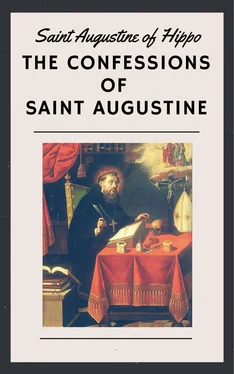But what marvel that I was thus carried away to vanities, and went out from Thy presence, O my God, when men were set before me as models, who, if in relating some action of theirs, in itself not ill, they committed some barbarism or solecism, being censured, were abashed; but when in rich and adorned and well-ordered discourse they related their own disordered life, being bepraised, they gloried? These things Thou seest, Lord, and holdest Thy peace; long-suffering, and plenteous in mercy and truth. Wilt Thou hold Thy peace for ever? and even now Thou drawest out of this horrible gulf the soul that seeketh Thee, that thirsteth for Thy pleasures, whose heart saith unto Thee, I have sought Thy face; Thy face, Lord, will I seek. For darkened affections is removal from Thee. For it is not by our feet, or change of place, that men leave Thee, or return unto Thee. Or did that Thy younger son look out for horses or chariots, or ships, fly with visible wings, or journey by the motion of his limbs, that he might in a far country waste in riotous living all Thou gavest at his departure? a loving Father, when Thou gavest, and more loving unto him, when he returned empty. So then in lustful, that is, in darkened affections, is the true distance from Thy face.
Behold, O Lord God, yea, behold patiently as Thou art wont how carefully the sons of men observe the covenanted rules of letters and syllables received from those who spake before them, neglecting the eternal covenant of everlasting salvation received from Thee. Insomuch, that a teacher or learner of the hereditary laws of pronunciation will more offend men by speaking without the aspirate, of a "uman being," in despite of the laws of grammar, than if he, a "human being," hate a "human being" in despite of Thine. As if any enemy could be more hurtful than the hatred with which he is incensed against him; or could wound more deeply him whom he persecutes, than he wounds his own soul by his enmity. Assuredly no science of letters can be so innate as the record of conscience, "that he is doing to another what from another he would be loth to suffer." How deep are Thy ways, O God, Thou only great, that sittest silent on high and by an unwearied law dispensing penal blindness to lawless desires. In quest of the fame of eloquence, a man standing before a human judge, surrounded by a human throng, declaiming against his enemy with fiercest hatred, will take heed most watchfully, lest, by an error of the tongue, he murder the word "human being"; but takes no heed, lest, through the fury of his spirit, he murder the real human being.
This was the world at whose gate unhappy I lay in my boyhood; this the stage where I had feared more to commit a barbarism, than having committed one, to envy those who had not. These things I speak and confess to Thee, my God; for which I had praise from them, whom I then thought it all virtue to please. For I saw not the abyss of vileness, wherein I was cast away from Thine eyes. Before them what more foul than I was already, displeasing even such as myself? with innumerable lies deceiving my tutor, my masters, my parents, from love of play, eagerness to see vain shows and restlessness to imitate them! Thefts also I committed, from my parents' cellar and table, enslaved by greediness, or that I might have to give to boys, who sold me their play, which all the while they liked no less than I. In this play, too, I often sought unfair conquests, conquered myself meanwhile by vain desire of preeminence. And what could I so ill endure, or, when I detected it, upbraided I so fiercely, as that I was doing to others? and for which if, detected, I was upbraided, I chose rather to quarrel than to yield. And is this the innocence of boyhood? Not so, Lord, not so; I cry Thy mercy, my God. For these very sins, as riper years succeed, these very sins are transferred from tutors and masters, from nuts and balls and sparrows, to magistrates and kings, to gold and manors and slaves, just as severer punishments displace the cane. It was the low stature then of childhood which Thou our King didst commend as an emblem of lowliness, when Thou saidst, Of such is the kingdom of heaven.
Yet, Lord, to Thee, the Creator and Governor of the universe, most excellent and most good, thanks were due to Thee our God, even hadst Thou destined for me boyhood only. For even then I was, I lived, and felt; and had an implanted providence over my well-being—a trace of that mysterious Unity whence I was derived; I guarded by the inward sense the entireness of my senses, and in these minute pursuits, and in my thoughts on things minute, I learnt to delight in truth, I hated to be deceived, had a vigorous memory, was gifted with speech, was soothed by friendship, avoided pain, baseness, ignorance. In so small a creature, what was not wonderful, not admirable? But all are gifts of my God: it was not I who gave them me; and good these are, and these together are myself. Good, then, is He that made me, and He is my good; and before Him will I exult for every good which of a boy I had. For it was my sin, that not in Him, but in His creatures-myself and others—I sought for pleasures, sublimities, truths, and so fell headlong into sorrows, confusions, errors. Thanks be to Thee, my joy and my glory and my confidence, my God, thanks be to Thee for Thy gifts; but do Thou preserve them to me. For so wilt Thou preserve me, and those things shall be enlarged and perfected which Thou hast given me, and I myself shall be with Thee, since even to be Thou hast given me.
I will now call to mind my past foulness, and the carnal corruptions of my soul; not because I love them, but that I may love Thee, O my God. For love of Thy love I do it; reviewing my most wicked ways in the very bitterness of my remembrance, that Thou mayest grow sweet unto me (Thou sweetness never failing, Thou blissful and assured sweetness); and gathering me again out of that my dissipation, wherein I was torn piecemeal, while turned from Thee, the One Good, I lost myself among a multiplicity of things. For I even burnt in my youth heretofore, to be satiated in things below; and I dared to grow wild again, with these various and shadowy loves: my beauty consumed away, and I stank in Thine eyes; pleasing myself, and desirous to please in the eyes of men.
And what was it that I delighted in, but to love, and be loved? but I kept not the measure of love, of mind to mind, friendship's bright boundary: but out of the muddy concupiscence of the flesh, and the bubblings of youth, mists fumed up which beclouded and overcast my heart, that I could not discern the clear brightness of love from the fog of lustfulness. Both did confusedly boil in me, and hurried my unstayed youth over the precipice of unholy desires, and sunk me in a gulf of flagitiousnesses. Thy wrath had gathered over me, and I knew it not. I was grown deaf by the clanking of the chain of my mortality, the punishment of the pride of my soul, and I strayed further from Thee, and Thou lettest me alone, and I was tossed about, and wasted, and dissipated, and I boiled over in my fornications, and Thou heldest Thy peace, O Thou my tardy joy! Thou then heldest Thy peace, and I wandered further and further from Thee, into more and more fruitless seed-plots of sorrows, with a proud dejectedness, and a restless weariness.
Oh! that some one had then attempered my disorder, and turned to account the fleeting beauties of these, the extreme points of Thy creation! had put a bound to their pleasureableness, that so the tides of my youth might have cast themselves upon the marriage shore, if they could not be calmed, and kept within the object of a family, as Thy law prescribes, O Lord: who this way formest the offspring of this our death, being able with a gentle hand to blunt the thorns which were excluded from Thy paradise? For Thy omnipotency is not far from us, even when we be far from Thee. Else ought I more watchfully to have heeded the voice from the clouds: Nevertheless such shall have trouble in the flesh, but I spare you. And it is good for a man not to touch a woman. And, he that is unmarried thinketh of the things of the Lord, how he may please the Lord; but he that is married careth for the things of this world, how he may please his wife.
Читать дальше












